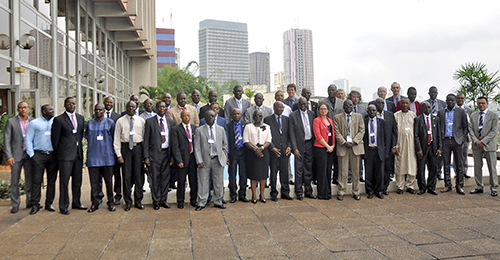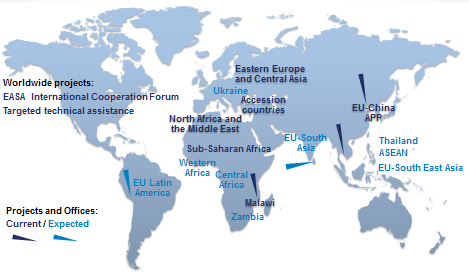As aviation goes beyond Europe’s borders, EASA works worldwide to raise safety standards, support industry and improve interoperability. It implements projects, which are mostly funded by the European Union, in partnership with its fellow authorities and regional organisations.
Being an authority and regional organisation itself, EASA has a unique insight into the challenges involved. It implements these projects together with its European partners to address the full scope of aviation. It coordinates with other technical assistance providers such as the International Civil Aviation Organisation (ICAO) to focus on efficient, practical and sustainable solutions. Technical training is an integral part of its activities.
The map below shows information on the current and expected future projects to be run by EASA. The upcoming projects are shown in light blue.
The arrows on the map represent the current and future locations of EASA’s project offices internationally, which exist to provide sustained on-site support.
Technical cooperation on the field: the example of the SIASA project
One of EASA’s technical cooperation projects was SIASA, a project implemented in Africa, starting on 15 January 2013 with a budget of 2.7 Million EUR. The project ended on 14 October 2016. It was implemented under the 10th European Development Fund (EDF) as part of the Intra-ACP (African, Caribbean and Pacific) Programme “Support to the Air Transport Sector and Satellite services applications in Africa”. Thanks to the project, technical assistance was offered to the Regional Safety Oversight Organisations (RSOOs) and Civil Aviation Authorities (CAAs) of Sub-Saharan Africa in various domains: Assistance to States, Guidance Material and Regulation, Workshops and Trainings, as well as organisational support to RSOOs. During the 45-month implementation period, many activities were implemented - mainly in Africa - with the support of EASA experts, external experts and the cooperation of Airbus and DGAC France.
- More than 400 persons attended trainings and workshops in the fields of Airworthiness, Aviation Training Organisation certification, Human Factors, ECCAIRS (European Co-ordination Centre for Accident and Incident Reporting Systems), Air Navigation Services (ANS), air operators’ approvals or OPS inspectors’ training.
- 35 bilateral assistance missions were conducted to 8 countries (Benin, Chad, Congo, Gabon, Guinea, Mozambique, Sierra Leone and Swaziland).
- Two working groups were established to develop PANS OPS guidance material and ANS regulation in French and English.

The Workshop “Technology Evolution – Impact on airworthiness” was developed with experts from EASA and Airbus and was held twice, in English and in French.
For more information on EASA’s technical cooperation activities, please go to https://www.easa.europa.eu/easa-and-you/international-cooperation



